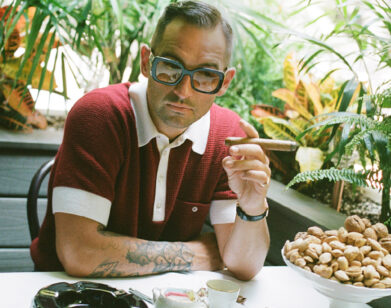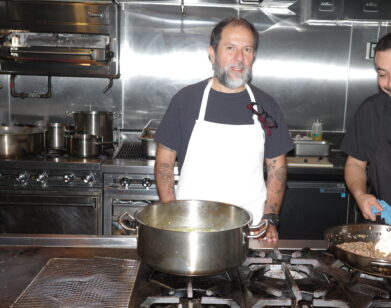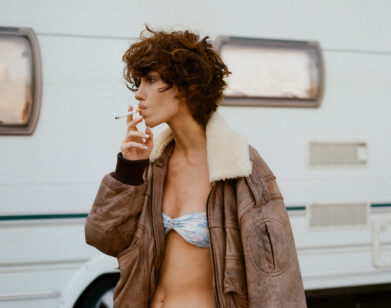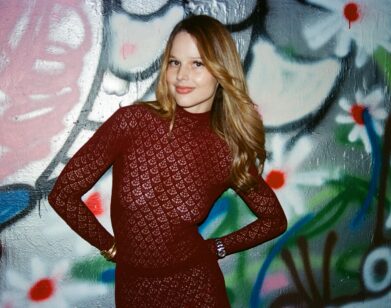The Royal Road
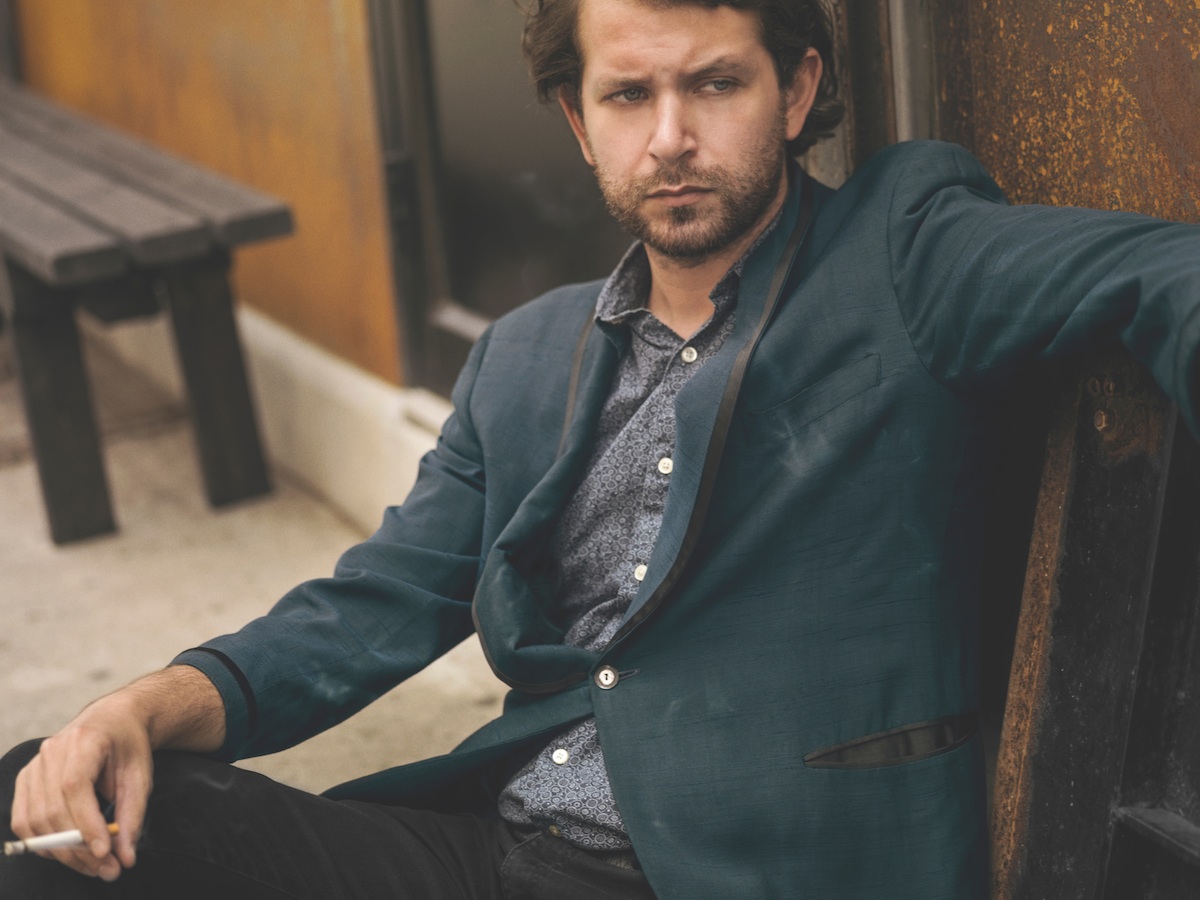
ABOVE: ROYAL YOUNG. PHOTO BY CHRISTOPHER GABELLO
Imagine everything you can think of that might happen to a kid growing up in the late ’90s and early aughts on the still-sketchy Lower East Side: neurotic, too smart for his own good, a little obsessed with danger, a lot obsessed with finding his place in the world. No matter what you’re imagining, chances are good you’ll find it somewhere in the pages of Fame Shark, the debut memoir from writer Royal Young. Chances are better you won’t have scratched the surface.
Young was just a kid—the son of a couple of loving, dysfunctional shrinks, one of whom also happened to be an artist with the temperament to match—when he decided his life’s ambition was to become a star. At first, the means by which he attempts it are funny, heartwarming foibles—background acting gigs; a disappointing run-in with Mel Gibson; friendships and adventures in the city—all filtered through the weird wanderings of the pre-adolescent mind. As Young grows up, though, the stakes get higher, and his encounters with drugs, sex, manipulation, and class grow ever more harrowing—and compulsively readable. (Though still, often, very funny.)
Royal Young is no stranger to Interview—he’s been a regular contributor for several years—and we met our friend at a Soho café to talk about fame.
ALEXANDRIA SYMONDS: The book is called Fame Shark, and ostensibly it’s about your never-ending quest for exactly that—but it seems to me that it comes to stand in for so many other things you felt like your life was missing.
ROYAL YOUNG: First of all, I think that fame is never an end in itself. I think that it’s a hungry ghost and a self-perpetuating monster where more is never enough. So I think what was filling in for me was an emotional connection. I never have a decent romantic relationship in the entire book because I just don’t give a fuck to do the hard work and ask the hard questions about myself, so I think it’s that—it’s a stand-in for love, it’s a stand-in for adoration, it’s a stand-in for emotional connection. It’s weird when I look back on it—I think someone had said this, they were like, “You never really auditioned for anything.” I don’t think that I really cared about fame per se, I think it was more that I needed an endless quest, and it was more about doing something that allowed me to drink and do drugs, and explore weird relationships and weird aspects of myself.
SYMONDS: You did also grow up in a time where fame qua fame was not only starting to emerge as a cultural force, but starting to be obsessively analyzed by people.
YOUNG: I think that was a huge, huge part of it, and I think that is so dangerous. I can only imagine the kids that are going to LaGuardia, you know, the “Fame high school,” now. They’re putting up YouTube videos expecting to be discovered the next day, and there’s something so entitled and so misleading about that—and it’s terrifying. Myspace had just hit, and you’re having Myspace celebrities like Tila Tequila, and Paris Hilton, who’s the princess of being famous for being famous and doing nothing. So when you see that, and you’re 18 years old and you’re lost and lonely and kind of entitled because you don’t really like yourself, that much, I think that’s such an appealing option. it’s so appealing to think that you can be a drunk mess and just go to these events and meet random celebrities or people connected to that world, and that will buoy you up into some perfect universe where all your problems disappear.
SYMONDS: Yeah. You didn’t stop going to parties, though.
YOUNG: That’s true, I love parties. [laughs] But now I see through them.
SYMONDS: Do you still want to be famous?
YOUNG: No… well, kind of. [both laugh] Here’s the difference: When you’re like “I’ll take anything—I’ll be a dancer, model, actor, singer, director, writer, poet, photographer, all wrapped up into one”—that’s just bullshit. But I think having been a journalist for the past seven years and having really been forced to take that ambition and hone it, and work really hard and go through a lot of rejection, critique, and work to develop a craft—sure, it’s important for me to be recognized for that. Is fame the most important aspect of it? No, I think the hard work comes first and if recognition comes from it, great. I still love flash bulbs and fancy parties; I think it’s interesting to talk to people that are successful and work at the height of their art, but it’s fame in a different way. I certainly don’t want to be robbed by the Bling Ring, basically. I don’t want to be recognized, I don’t want to be trailed.
SYMONDS: You want to be writing about it. You want to be Nancy Jo Sales.
YOUNG: She’s awesome.
SYMONDS: For me, when I turn in a big piece, there’s always this feeling of dread: “What detail did I get wrong?” Is there a disconnect between the journalist mindset and the memoirist mindset, and you were able to turn that impulse off, or did you feel that way, too?
YOUNG: I wrote the book like a journalist. I interviewed my parents, I interviewed my brother. I went back to old diaries, I printed out old e-mails. And a lot of the dialogue in the book is verbatim from e-mails. When I was in high school, my girlfriend and I would pass journals back and forth, and she had kept all of them. We’re still really good friends, and I was lucky enough that she was willing and so open to the idea of me pulling directly from them. So all our dialogue is literally stuff that we had written to each other or said to each other. And in that sense, I wanted to stay as true to life or true to fact as I could.
Then again, it’s a memoir, and I wrote it for the attention span of a meth-head American kid. I want young kids to be able to read this. So certainly the book is written kind of like a novel—there’s an arc, and there’s a conflict. So part of it was journalism, part of it was research, and part of it was, How do I take my life and shape it into a story?
SYMONDS: Is there anyone in the book you weren’t able to get in touch with?
YOUNG: There a few people I didn’t care to get in touch with. I mean, honestly… fuck ’em.
SYMONDS: [laughs]
YOUNG: I changed their names; I changed enough about them. No one gives a shit. And the book is not about them, right? There were only four people I really cared for that were so important that I didn’t want to do anything to jeopardize our relationship, which include my brother, my parents, my high school girlfriend, and [the girl I call] Georgie in the book. I basically said, “Read it before it goes to press, and anything you want to changed, we can talk about.” My parents hated it, but they didn’t really want to change anything because they’re weird artists. So they’re still proud despite their problems with their portrayal, and my high school girlfriend was amazing about it and just loved it. Georgie corrected a few things. She was like “Actually, I wanted to have that threesome; it was the other girl that didn’t.” I was like, “What do you mean?! I didn’t know that, and now I’m really angry that it never happened, I thought it was you!” So I changed that.
SYMONDS: With the five of them, then, did you find the reactions ran pretty much in line with what you’d expect based on human nature—the people who were depicted positively liked it and the ones depicted negatively didn’t like it? Or were they all more circumspect about it than you would have predicted?
YOUNG: I didn’t really know what to expect. I feel like I was so divorced from writing at that point. I had kind of forgotten the emotional impact that it might have on first reading, so I was completely taken aback and shocked by how upsetting it would be to my parents. The book is a monument to the obvious, which is that I’m incredibly in love with both of them, and the only reason that I’m able to write so openly about the different conflicts we go through is because they are so supportive and encouraging and inspiring and really incredible people. So that really shocked me and that’s something we’re still working on as a family. I guess in retrospect, how stupid of me to think they would feel any other way.
SYMONDS: I wanted to talk a little bit about the process of writing….
YOUNG: I’d rather not. This interview is over! [laughs]
SYMONDS: [laughs] I think with any memoir, there are two journeys. Obviously there’s the one in the book. But presumably, you’re also a different person than the person who started writing the book. How long did it take you?
YOUNG: It’s weird. In the book, I’m trying to be a model, and I have a meeting with a this men’s agent at Wilhelmina, and he’s like, “Dude, what the fuck are you doing? This is insane, you’re never going to make any money, and fashion sucks. You can be a crazy city kid for the rest of your life, or you can sit down and focus on your writing.” The first drafts of Fame Shark ever came out of that meeting, when I was 18. I started writing right away. That will be 10 years ago from when the book comes out. I found them recently and they’re just little scribbles and they’re so, so rough.
SYMONDS: Where were you living on the Lower East Side while you were writing the book?
YOUNG: No, I was living in Brooklyn at that point.
SYMONDS: You live there now, though, and some of my favorite detail in the book is about what that was like in the ’90s. So to be positioning yourself now as a dude who wrote this book about the Lower East side and is there again—how does that feel?
YOUNG: For sure. It’s weird. It’s bizarre. I’m surrounded by history when I walk down the street. And my maternal grandmother grew up on the Lower East Side in the ’40s and ’30s, so she knows a whole different incarnation of it. For me, it’s just a testament to the fact that this neighborhood always has been changing. I think in my early 20s and teens I was angrier about it, because I felt the people coming in had no respect for the history of the neighborhood—that’s my big beef. I don’t care if it changes, I’m all for change. It’s ridiculous of me to be nostalgic for hookers and shootings and crackheads on the corner that I’m scared of, do you know what I mean?
SYMONDS: Yeah, of course.
YOUNG: My issue is that people don’t have any respect or any preservation for the neighborhood. They’re just bulldozing it for luxury condos and hotels. So the neighborhood is completely haunted for me; I live on the same street my grandfather had a bachelor pad in the ’40s. It gives me a feeling of connectedness to my environment, and it makes me proud to be able to tell this story. I’m just privileged to be an ambassador from the ghetto days.
SYMONDS: I was glad you brought up the idea of teenagers reading this book, because I’m interested in the extent to which you do and don’t romanticize all that stuff. For people who grew up here, it’s such a weird, competing impulse to be like “It was horrible, my life was shit! And I really miss it.” You know? [laughs] The neighborhood was wild, and so were you.
YOUNG: If you can handle it, I honestly think fucking up is an amazing way to find yourself. Is it something that I still do? No. Is it something I think you should stay in? No. Should you should go become a crackhead junkie? Absolutely not. But I think there’s something to be said for getting drunk and trying drugs and meeting in seedy places and being around dangerous people and making mistakes. I won’t take responsibility if anybody ends up dying, but I learn the best from messing up, and I think so many people do. I think it’s the only way a lot of people really can truly learn what not to do. So yeah, I think it’s awesome. Go do drugs and be fucked-up for a few years, especially when you’re young and your body can bounce back.
SYMONDS: Especially in the Bushwick section of the book, it seems like there were a lot of false rock bottoms. [laughs]
YOUNG: There totally were. [laughs]
SYMONDS: Writing through that stuff, when does it stop being painful? Or does it?
YOUNG: Honestly, the watching my drug dealer’s sex tape, and smoking crack with a crackhead, and selling my body for sex—that stuff isn’t painful for me. It’s the family stuff that gets me. I think that speaks to a change in myself. All the debaucherous whatever, to me that’s just a young kid fucking up and learning about who they are. It’s the family conflict—the ways that I hurt my parents, and the ways that I hurt girls I love that could’ve been good relationships—that’s what upsets me when I look back and read it.
SYMONDS: It still does, even now?
YOUNG: Yeah, I still feel bad about it. That was one of the reasons I gave the book to them. That was one of the reasons that I said, “I want your input.” It’s the wholesome stuff that gets me. I’m a sucker for that.
SYMONDS: I thought it would be fun to ask you some questions you’ve asked people for Interview in the past.
YOUNG: Oh cool, let’s do it. I was not expecting that at all.
SYMONDS: You asked Kristen Johnston: “How did being a young freak shape your later life?”
YOUNG: This is incredible. I’m still a young freak. [laughs] That’s my answer.
SYMONDS: You asked Miles Klee, “How do humiliation and revenge inform our actions?”
YOUNG: I was a really embarrassed kid, and other kids can sense that about you, and they just want to humiliate the shit out of you even more. Revenge, I think, was a driving force when I started this book. I also think when I started this book, I still had these bizarre, narcissistic ideas that this book would catapult me to celebrity—like, it would be the thing. I think revenge is incredible—my favorite book is The Count of Monte Cristo, I love the TV show [laughs]—all things revenge are awesome to me. I disagree with the modern take on it that when you start on a path for revenge, you need to dig two graves.
SYMONDS: You asked Lionel Shriver, “Where do you think the urge to distinguish ourselves comes from, and can it be dangerous?”
YOUNG: It’s hugely dangerous; it fucked up my whole life! [both laugh] I think that it comes from an emptiness or loneliness, or feeling that you’re not really worthy or deserving of love. It’s like that phrase “achievement becomes redemption,” and at the end of the day it’s just not. It’s just dangerous to confuse the two. [laughs] [pauses] I love Lionel, by the way. She changed her name too, when she was 13.
SYMONDS: You asked Shannon Moroney, “How well can you really know the people you love?”
YOUNG: God, these are heavy questions.
SYMONDS: That was the first question in the interview, too.
YOUNG: Jesus Christ! [laughs] I think you can only know them as well as you know yourself. You have to know yourself before you can empathize with other people. I think so often we hurt the people we love the most…
SYMONDS: If you’re not invested, you can’t.
YOUNG: Yeah, absolutely. That’s the number one—you have to care to know them. I think it’s all a process that never ends. When you really love someone, you go through so much with them, and you are constantly growing, and it can be an exciting thing. It can also be a dangerous thing, you are in a relationship and you can get to know a person over a year or two years or however long that may be, and you realize at the end of the day you realize that they’re not right for you. So it’s a scary thing getting to know people you love.
SYMONDS: Do you think your perception of with how much authority you could speak about the people you love changed the way you were writing it?
YOUNG: Yeah, I think they became more characters and less human beings. [laughs]
SYMONDS: “Does money change everything?” [both laugh] Which I’ll point out is something you asked Martin Amis, who wrote a fucking book called Money, so it did for him. [both laugh]
YOUNG: Yeah, of course it does. I think there’s a peak where a certain amount of money changes your life for the better, and then you hit a peak and then it just goes down. I think excess money turns people into absolute insane out-of-touch megalomaniac fuckers.
SYMONDS: Something you asked Caitlin Moran: “Let’s talk about fashion, which I feel can often be such a horrible force.”
YOUNG: [laughs] I hate fashion so much. It’s weird, too, because of gentrification. Everything is so available. If you look around, every motherfucker dresses kind of cool now.
SYMONDS: [laughs]
YOUNG: Like, everyone. It’s not because they actually are, it’s just because they can buy it, which is so lame to me. Even just 10 years ago, that wasn’t the case. There were weird stores on Lafayette that would play electro-clash from Germany from the early ’80s, and I was scared to go in them as a teenager, because the clerks were like, “What the fuck is this kid doing in here trying on bell-bottoms?” But I miss that. I don’t think fashion should be so accessible—I think that people should be encouraged to find their own sense of it.
SYMONDS: Last one, you asked Rebecca Dana, “What did you end up finding out was the difference between who you wanted to be and how you came out?”
YOUNG: I think I came out stronger. I think the reality of hitting rock bottom and being crushed by life is amazing. I couldn’t have asked for anything better. I feel like it’s made me so much stronger and more self-aware, and just a more genuine, caring person. It’s also not made me not waste time on people who are vacuous and empty and all about status. That has been such an important lesson to learn, that love and kindness are such strong forces—there’s nothing wrong them, there’s nothing wrong with embracing those aspects of yourself. I think when you think about the future in terms of who you want to be as a person rather than what you want to accumulate—that’s when things can really open up.
FAME SHARK IS AVAILABLE NOW.

